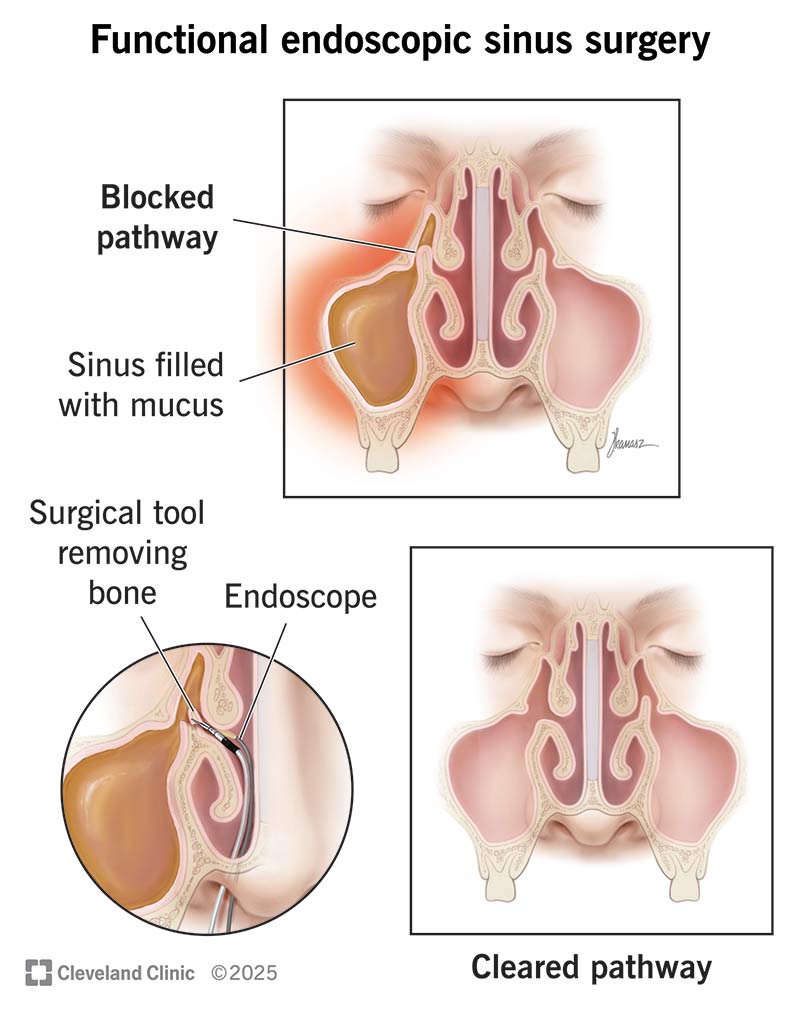Functional endoscopic sinus surgery (FESS) is minimally invasive surgery for serious sinus conditions. It’s mostly used to treat chronic sinusitis and nasal polyps. Healthcare providers use nasal endoscopes to operate inside your nostrils, so there are no incisions in or around your nose. Most people who get it notice major symptom improvements.
Advertisement
Cleveland Clinic is a non-profit academic medical center. Advertising on our site helps support our mission. We do not endorse non-Cleveland Clinic products or services. Policy

Image content: This image is available to view online.
View image online (https://my.clevelandclinic.org/-/scassets/Images/org/health/articles/functional-endoscopic-sinus-surgery)
Functional endoscopic sinus surgery (FESS) is a minimally invasive surgery for sinus conditions. It allows healthcare providers to operate on your sinuses through your nostrils. This means there are no cuts (incisions) in or around your nose that can leave visible scars. It’s also known as just “endoscopic sinus surgery.”
Advertisement
Cleveland Clinic is a non-profit academic medical center. Advertising on our site helps support our mission. We do not endorse non-Cleveland Clinic products or services. Policy
You may need FESS if mucus isn’t draining from your sinuses or nasal cavity as it should. This can create an obstruction in your nose that can feel painful and make it hard to breathe. Usually when this happens, medicines like antibiotics or nasal sprays help. But if they’re not doing the trick, you may need surgery to remove tissue or bone causing issues.
Your provider may recommend FESS if you have one or more of these conditions:
Your healthcare provider may perform FESS to repair abnormalities at the base of your skull or to correct problems causing leakage of brain fluid (cerebral spinal fluid leak).
Your healthcare provider will let you know what to do before surgery. Everyone’s situation is different, but your provider may recommend that you:
Advertisement
During FESS, your healthcare provider will use a thin tube with tiny surgical tools to operate on your sinuses. The tube is called a nasal endoscope. The exact steps depend on your situation. But in general, your healthcare provider will:
Afterward, they may scrape out tissue. They may pack your nose with material to absorb any blood or discharge. But not all surgeries require this.
Most functional endoscopic sinus surgeries last about two to three hours if both sides are involved. But everyone’s case is different.
FESS restores drainage and airflow in your sinuses. It can help you breathe better, which improves your overall quality of life. Even when some symptoms remain, most people notice major improvements.
FESS has few risks. But complications can happen if nearby structures get damaged during surgery. Issues include:
According to a recent study, even the most common complication (heavy bleeding) only happens in 3 out of every 100 surgeries. FESS is the standard procedure for serious sinus conditions. This means that providers know a lot about preventing complications.
You’ll spend some time in a recovery room so your healthcare provider can monitor your condition. Before you go home, your provider will tell you what to expect. For example, you may have slight bleeding, stuffiness and discomfort for a few days. This is normal.
They’ll also let you know how to care for yourself during recovery. They may tell you to:
It may take a few months before you feel as if you’re fully recovered from FESS. Most people go back to school or work in a week or so. Most resume their normal routine within two weeks.
Advertisement
You’ll have a follow-up visit a few weeks after your surgery so your provider can remove dried mucus or blood from your nose. They’ll also check on your progress.
Reach out if your symptoms get better but then return. It may be a sign of a polyp that’s grown back and needs removal again. Or you may need medicine to manage chronic inflammation.
FESS is a safe and effective surgery that healthcare providers use to treat chronic sinus issues. It can ease symptoms like nasal congestion and facial pain from blocked sinuses. If your provider recommends this procedure, ask them about the benefits. Depending on the condition you have, FESS may cure some, or even all, of your symptoms. Make sure you know the expected results. Check into your procedure confident that this surgery is right for you.
Advertisement
Learn more about the Health Library and our editorial process.
Cleveland Clinic's health articles are based on evidence-backed information and review by medical professionals to ensure accuracy, reliability, and up-to-date clinical standards.
Cleveland Clinic's health articles are based on evidence-backed information and review by medical professionals to ensure accuracy, reliability, and up-to-date clinical standards.
Constant stuffiness, sinus pressure and pain can wear you out. But you don’t have to live with it. Cleveland Clinic sinus surgery experts can help you get relief.
